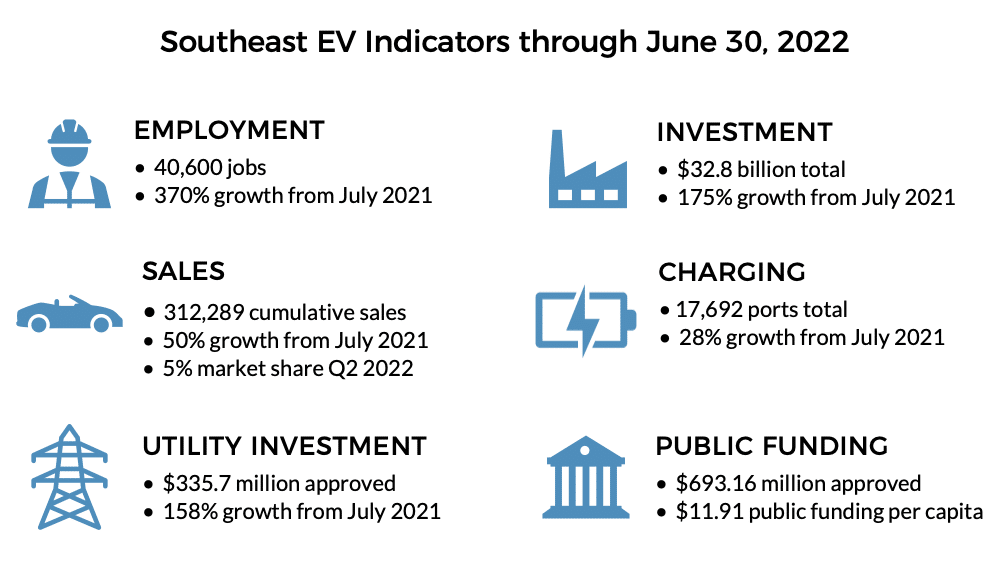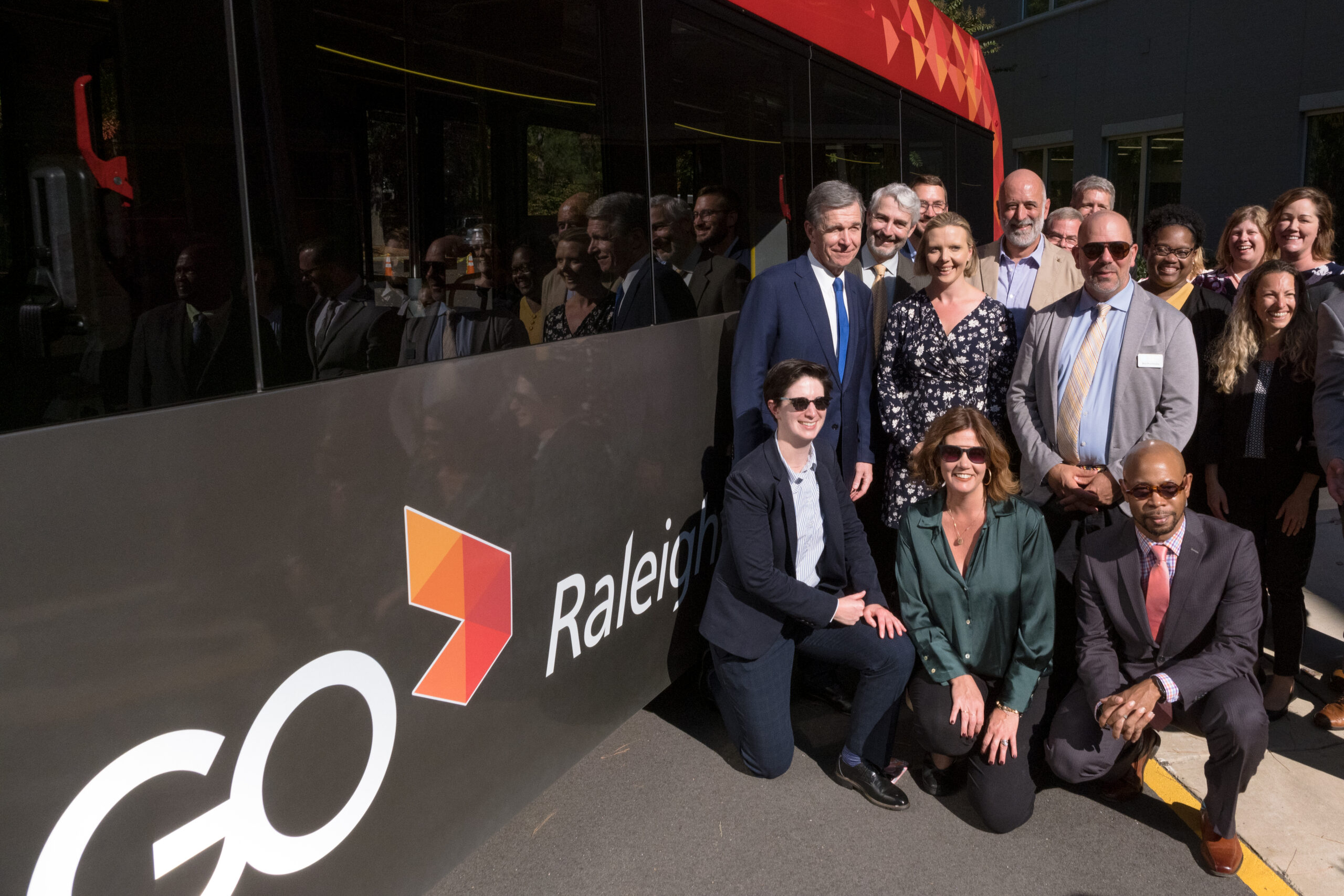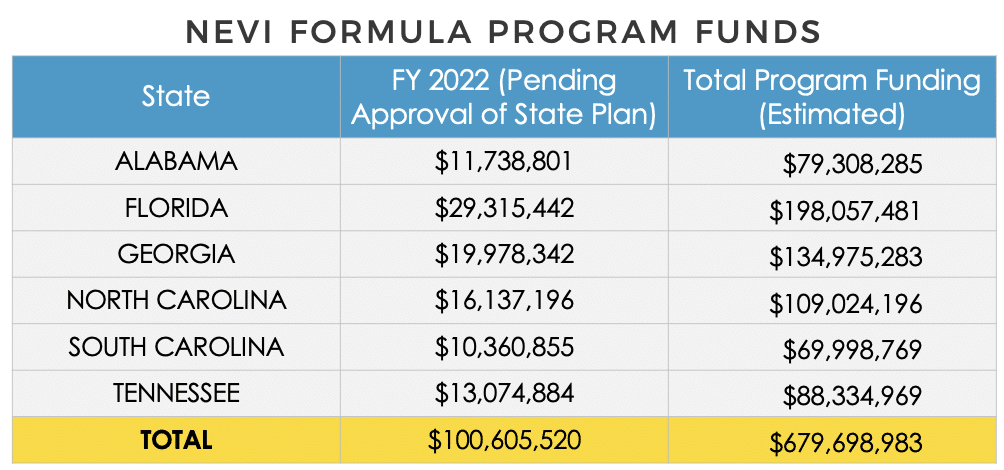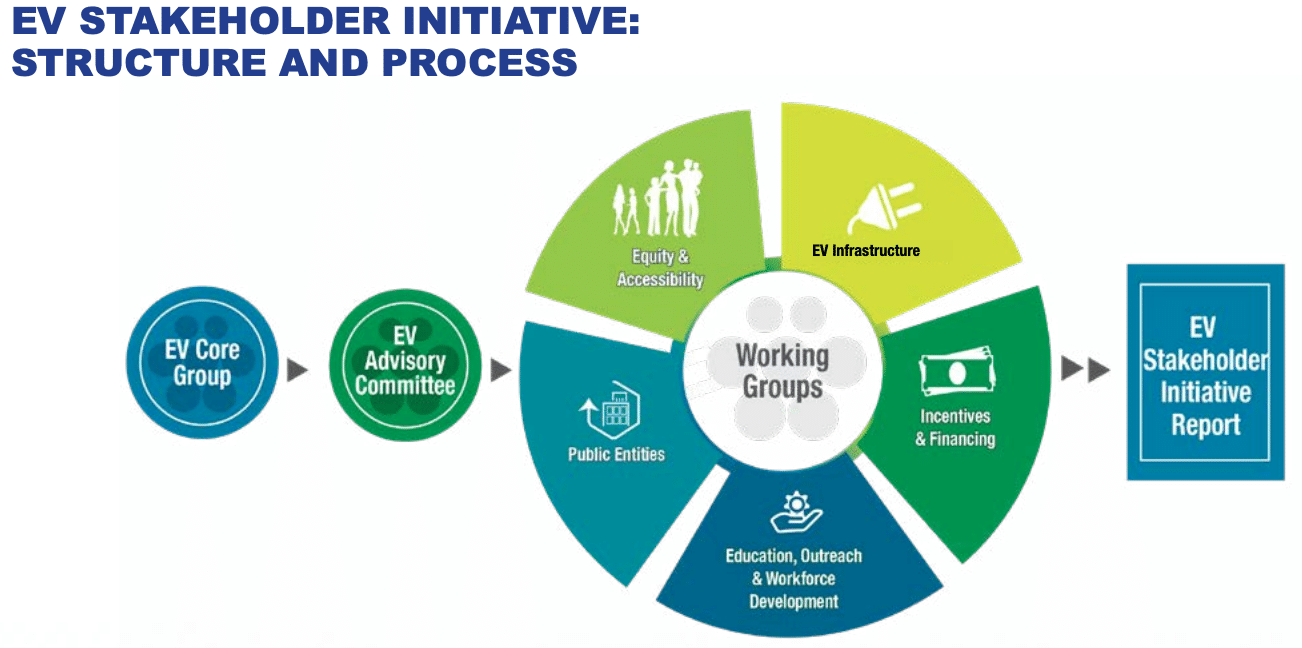Electric vehicle (EV) sales trends and federal policies grab headlines, but state and local governments' actions are helping drive market growth.
Stan Cross | December 30, 2022 | Clean Transportation, Electric Vehicles, Energy PolicyIf 2022 goes down as the year the nation and the Southeast reached the electric vehicle tipping point, federal, state, and local government actions may prove to be critical catalysts. There has rightfully been a lot of buzz about the federal Bipartisan Infrastructure Law (BIL), which turned one last month, and the Inflation Reduction Act (IRA) signed into law in August 2022. These federal policies create programs to incentivize every aspect of the light, medium, and heavy-duty EV ecosystems, from consumer and fleet purchases to domestic manufacturing and workforce development; they are historic clean energy legislation in scope and substance. But you might have missed the state and local government actions that strengthened the EV market foundation that BIL and IRA programs will build upon.
The first half of 2022 saw sustained EV market growth here in the Southeast. Our “Transportation Electrification in the Southeast” report, published in partnership with Atlas Public Policy and released in September 2022, showed all indicators trending in positive directions, with the region capturing over one-third of America’s total EV manufacturing investments and jobs. Note: these numbers will be updated in February to reflect year-end totals.

As we reflect upon this impressive growth and await what will likely be equally impressive year-end numbers, there are notable state and local actions afoot that will help carry market momentum into the new year. Here are a few highlights.
State Actions
North Carolina was the stand-out, Georgia and South Carolina made strides, and all states prepared to receive federal infrastructure funding.
Policy
The Georgia legislature launched the Joint Study Committee on the Electrification of Transportation. The committee held six meetings across the state to receive input from EV stakeholders and the industry on how to support thriving electric car, truck, and bus markets in the state, a critical inquiry given that Georgia leads the nation in anticipated EV manufacturing jobs yet lags nationally in EV sales. The committee agreed on some EV infrastructure needs, including legislation allowing EV charging infrastructure owners to sell power to EV-driving consumers, which supports EV infrastructure business models, and legislation requiring state licensing and inspection of commercial EV charging stations to support EV infrastructure performance and reliability.
North Carolina Governor Cooper took center stage at the beginning of the year with Executive Order 246, which committed the state to address climate change and build an equitable clean energy and clean transportation economy. Not only are the carbon emission reduction and transportation targets in the order among the most aggressive in the country, but most importantly, it centers equity and justice. Specific to transportation, the order seeks to increase the total number of registered zero-emission vehicles in the state to at least 1.25 million and the in-state sales of new vehicles to 50% zero-emission by 2030. And in late October, the governor again asserted his leadership by issuing Executive Order 271, which directed the North Carolina Department of Environmental Quality to begin the Advanced Clean Trucks (ACT) rulemaking process to ensure zero-emission trucks and buses are available for purchase in the state. The ACT rule is designed to reduce the costs of zero-emission medium- and heavy-duty vehicles and further develop the market for these vehicles. The executive order also requires state Cabinet agencies to prioritize strategies that further environmental justice and health equity to ensure transportation electrification results in improved health outcomes for communities impacted worst by air pollution.

In South Carolina, Governor McMaster signed Executive Order 2022-33 that “prioritizes the state’s efforts to recruit electric vehicle-related businesses to South Carolina by training the state’s workforce to be prepared for the jobs related to the industry and establishing a ‘one-stop-shop’ at the South Carolina Department of Commerce for businesses interested in investing in the state.” This executive order seeks to improve the state’s competitive position as it trails Georgia, North Carolina, and Tennessee in EV manufacturing investments and jobs. The order also creates an Interagency Working Group that will work with stakeholders and local governments to develop a comprehensive electric vehicle-related resources and infrastructure deployment plan.
Planning

The $5 billion National Electric Vehicle Infrastructure (NEVI) Formula Program is the cornerstone of $7.5 billion in EV infrastructure funding made available by the Bipartisan Infrastructure Law. NEVI funding aims to provide a network of 500,000 ultra-fast EV charging stations along the nation’s travel corridors to help make cross-country electric travel accessible to all Americans. To access formula funding, states had to submit NEVI plans for Federal Highway Administration (FHA) approval, which all states did, including across the Southeast, where nearly $680 million is expected to flow over the five years. The current state plans are mostly ‘plans to plan’ given the tight initial plan turnaround required by FHA. Going forward, states must engage stakeholders in detailed planning to ensure NEVI implementation results in efficient, effective, and equitable deployment.
The South Carolina Energy Office released its anticipated EV Stakeholder Initiative Report as required by the 2021 passage of ACT 26. The report will inform future Energy Office EV activities and provides decision-makers with recommendations regarding the challenges and opportunities related to transportation electrification.

The years-long multi-stakeholder effort resulted in recommendations focused on four areas:
-
- Increase consumers’ and fleet operators’ EV awareness through the development and funding of a brand-agnostic EV awareness campaign for South Carolina
- Expand public entity and private industry collaboration to identify solutions, develop tools and programs, and facilitate honest conversations as the EV industry grows
- Create a Statewide Electrification Roadmap that provides a plan for a competitive advantage in advancing EV manufacturing and workforce development, EV infrastructure, and EV sales within the state
- Accelerate the state’s EV market by considering legislative action to address stakeholders’ policy and regulatory recommendations
To support the transportation and climate goals of Governor Cooper’s Executive Order 246, the North Carolina Department of Transportation was tasked with developing a multi-stakeholder and multi-agency informed Clean Transportation Plan. The planning process kicked off in early 2022, and when completed by April 2023, it will recommend actionable strategies for decarbonizing the transportation sector that addresses the challenges and opportunities facing light, medium, and heavy-duty EV growth, charging infrastructure deployment, public and private fleet EV adoption, and vehicle miles traveled reduction while centering equity throughout the planning process. The planning process has engaged hundreds of stakeholders through online and in-person convenings and working group meetings where actionable strategies have been fleshed out.
Local Actions
Local governments across the Southeast led the charge in 2022, implementing initiatives and passing policies to drive EV adoption.
Florida
- Miami-Dade County’s Department of Transportation and Public Works (DTPW) secured $19.8 million in Volkswagen Settlement funds to purchase 63 sixty-foot electric transit buses. DTPW already secured funds for 75 forty-foot electric transit buses, which, once in full operation, will represent one of the largest fleets of forty-foot electric buses in the United States.
- Pinellas Suncoast Transit (PSTA) was awarded $18 million in Volkswagen Settlement funds to purchase 60 electric transit buses and will work with Duke Energy Sustainable Solutions to meet its charging infrastructure needs. With this purchase, 31% of PSTA’s bus fleet will be electric by 2026.
- Leon County (Tallahassee) Board of County Commissioners adopted an EV-ready ordinance enhancing EV charging station infrastructure and EV parking requirements. The ordinance intends to “facilitate the use of EVs and to further the establishment of a convenient, cost-effective EV infrastructure that will accommodate future technology advancement.”
Georgia
- Atlanta City Council introduced legislation to launch an e-bike rebate program to make e-bikes more affordable for city residents.
- Clayton County schools received $10 million from the Environmental Protection Agency to buy 25 electric buses and charging infrastructure.
- Chatham Area Transit (CAT) secured funding to add four more electric buses to its fleet, bringing its total to 10 electric buses or 15% of its public transportation fleet. CAT services Savannah and is the first public transit on the Georgia coast to go electric.
- Savannah added two more EVs to the city’s fleet to help achieve the goal of 15% of the city’s vehicle fleet being powered by alternate fuels or hybrid technology by 2023.
North Carolina
- Charlotte electrified the North Carolina local government scene in 2022:
- Charlotte City Council approved a contract to purchase and install 25 electric vehicle charging stations at the Charlotte-Mecklenburg Government Center parking deck on Davidson Street. The charging stations will serve the City of Charlotte’s growing fleet of electric vehicles to reduce carbon emissions.
- The new Charlotte Unified Design Ordinance includes an EV Ready Policy that requires that 20% of parking spaces are EV-capable at multi-family stacked dwellings, the residential component of mixed-use developments, hotels, and parking lots and parking structures with more than ten parking spaces.
- Charlotte announced an EV car-sharing service at affordable housing sites.
- Charlotte deployed pioneering EV charging infrastructure technology that could provide a solution for people that lack the off-street parking needed for home charging systems. The new solution, PoleVolt, uses existing streetlight infrastructure to slash the costs associated with installing charging stations by as much as fifty percent.
- The City of Raleigh teamed up with Plug-In NC to create a comprehensive EV-ready playbook for planning and installing public, residential and workplace charging. The document covers the basics of vehicle charging, electric utility considerations, charging station types and placement, the permitting process, installation steps, future-proofing, case studies, and more.
Tennessee
- The Nashville Department of Transportation and Multimodal Infrastructure and micro-mobility providers Bird, Lime, and Spin are partnering on Nashville’s first e-bike pilot program, which seeks to promote the responsible use of e-bikes as a transportation option.
- Knoxville’s Office of Sustainability is engaging the community to determine where EV charging infrastructure is needed. The city is using a public survey (in English and Spanish) and a location suitability map to gather data that will be used to identify where EV chargers should be placed.
- US Department of Transportation awarded $4.57 million to Chattanooga for an integrated, smart transportation management system for EVs. The project will gather network-wide data to link EV users to available charging stations in real time and make Chattanooga the largest urban test bed for smart transportation.
Across the region, we are seeing years’ worth of planning and implementation of clean transportation programs and policies starting to bear fruit and are having an outsized impact on our region. Those local governments and state agencies that have taken the time to understand the value proposition of transitioning to electric and have taken steps to assess their communities’ electric transportation needs and then actively pursued solutions are receiving a flux of federal dollars that are coming with the BIL and IRA. What is truly exciting is the private capital coming to the region along with the federal dollars. The economic growth in manufacturing and driving electric cars, trucks, and buses in the Southeast is being realized and just getting rolling!
Electrify the South is a Southern Alliance for Clean Energy program that leverages research, advocacy, and outreach to promote renewable energy and accelerate the equitable transition to electric transportation throughout the Southeast. Visit ElectrifytheSouth.org to learn more and connect with us.